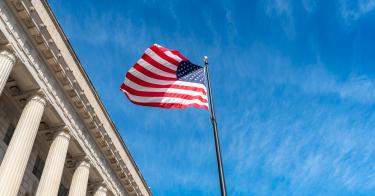To make sense of the Supreme Court's decision in the "faithless electors" case, it helps to remember something pretty basic: When you vote in a presidential election, you're not actually voting for your chosen candidate.
When Americans vote in November, they're actually casting votes for a slate of electors selected by the political party of each presidential candidate. The electors of the candidate who wins the popular vote in each state are appointed to be the electors who will cast a vote in the meeting of the Electoral College in December.
The only exceptions are Maine and Nebraska, which divide up their electors according to the statewide popular vote totals and the popular vote totals in their congressional districts.
Each state gets the number of electoral votes equal to their members of Congress. This system balances the interests of states with large populations and the smaller, less populated states. It prevents big city, urban populations from controlling the selection of the president and ensures that candidates won't ignore the smaller states.
Thirty-two states and the District of Columbia have statutes that require electors to vote the way they pledged to vote when they became electors. In other words, an individual who agrees to become an elector for the Democratic Party must promise or pledge to vote for the Democratic presidential candidate if that candidate wins the majority of the popular vote in the state.
Fifteen states, in fact, impose sanctions against a "faithless elector" who breaks his pledge, such as a fine. Most also remove a faithless elector, nullify his vote, and substitute an alternate elector.
The Supreme Court was confronted with whether states can enforce these pledge laws. In two cases, one out of Colorado and the other out of Washington state, all nine justices agreed that states could nullify the votes of "faithless" electors and punish them by removal (as Colorado did) or imposing a fine (as Washington did).
The Washington case involved three electors who had pledged to vote for Democratic presidential candidate Hillary Clinton in the 2016 election. Instead, they voted for Colin Powell, even though Clinton carried the state and Powell wasn't even on the ballot. They were fined $1,000 each.
Similarly, in Colorado, three Clinton electors announced they were instead going to vote for Ohio's former governor, John Kasich. Only one actually did it, although his vote was not counted because the Colorado secretary of state removed him as an elector and replaced him with an alternate elector who voted for Clinton. The other two electors cast their votes for Clinton after they saw what happened to the first elector.
In 2016, there were only "seven electors across the Nation who cast faithless votes" said the court. In fact, there have only been 180 faithless electors in the entire history of our presidential elections out of more than 23,000 electoral votes, or only one-half of 1 percent. Faithless electors have never come close to affecting the outcome of a presidential race.
The applicable section of the Constitution is very straightforward. Article II, Section 1 says state legislatures can appoint electors in "such Manner" as they choose. According to eight of the justices, the power to appoint electors in any manner "includes power to condition his appointment," which includes insisting that "the elector pledge to cast his Electoral College for his party's presidential nominee, thus tracking the State's popular vote." The court said this also means the state can enforce its conditions on appointment.
Justice Clarence Thomas concurred in the judgment, but based his opinion not on the Article II language, but on the fact that "The Constitution does not address—expressly or by necessary implication—whether States have the power to require that Presidential electors vote for the candidates chosen by the people." This leaves it up to the states.
The majority opinion was written by Justice Elena Kagan, who loaded it with references to modern popular culture, including the hit HBO series "Veep" as well as the Broadway show "Hamilton."
The bottom line is that the opinion safeguards the Electoral College and, as Kagan says, requiring electors to live up to their pledges to vote according to what the majority of voters in their state decide "accords with the Constitution—as well as with the trust of a Nation that here, We the People rule."
This piece originally appeared in the Lincoln Journal Star




